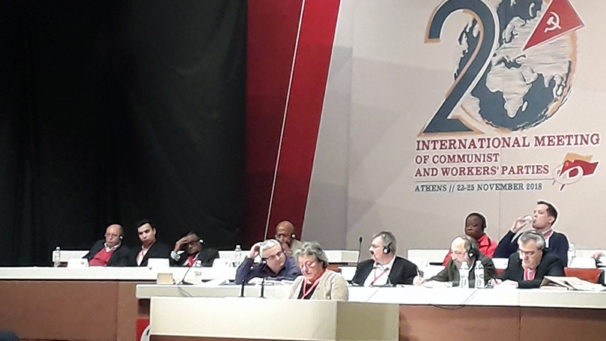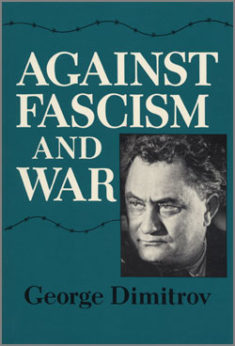
Editor’s Note: The 20th International Meeting of Communist and Workers’ Parties was held in Athens, Greece from November 23-25, 2018. Over 90 parties from around the world participated. Rossana Cambron and Chris Butters represented the Communist Party USA at the conference, with Cambron delivering the party’s contribution. Her remarks, as prepared for presentation, are presented here.
This 20th International Meeting occurs in the middle of a profound crisis of the capitalist system and amid increasing attempts to solve it along extreme right and fascist lines. The classic definition of fascism was offered by Georgi Dimitrov at the 7th World Congress of the Communist International in 1935: “Fascism is the open terroristic dictatorship of the most reactionary sections of finance capital.”
Recently, these reactionary forces have taken control through the legislative process, rather than by force.
These developments require even greater unity among all Communist and Workers’ Parties. They call us to be more vigilant in striving for common ground and to focus on building a united front to confront, vote out, and expose extreme right and fascist leaders. We need to develop tools to help workers in each of our countries to understand their power to resist right-wing propaganda and to recognize when their own ideas are being used against them.

The battle of ideas is critical. In many places, the right has gained control and manipulated workers to act and vote against their own self-interest. Our task, as a political vanguard, is to raise the political level of working people to be able to fight off these attempts.
The coming to power of political forces promoting unbridled racism, anti-Semitism, and right-wing nationalism represents a grave danger throughout the world. In the United States, Donald Trump leads an extreme right and fascist-minded administration.
The Trump regime represents the most reactionary sections of big business
The Trump regime represents the most reactionary sections of big business, whose agenda it pursues no matter what the cost to democracy, labor rights, civil rights, the environment, and even human decency.
In the U.S., their instrument is a coalition of the Republican Party combined with finance capital, evangelical Christians, and the right-wing media. That coalition is working to dismantle the hard-fought gains of the labor and civil rights movement. They want to destroy what their ideologues term the “administrative state.” This would be accomplished by eliminating collective bargaining, privatizing government programs, and removing all regulations on big business, particularly with regard to the environment.
Internationally, they seek U.S. imperialist dominance by promoting Europe’s extreme right and redefining the U.S.’s ties to NATO and its relations with other international bodies, trade agreements, and countries. A key aim is to forge a coalition against China. This is what’s behind Trump’s withdrawal from the treaty governing medium-range missiles.
During the midterm elections in the U.S., Trump campaigned on an openly racist platform. Immigrants were demonized. Children were separated from their parents and jailed in cages along the U.S./Mexico border. A caravan of Central Americans seeking relief and asylum was called an “invasion,” and 5,000 U.S. troops have been sent to intercept them. It was a campaign of fear, hatred, and intimidation.
At stake in the elections was the very character of our nation, with democracy itself hanging in the balance. Would the broad working-class public accept Trump’s vilification of the press, the attack on public institutions, and the Republican Party’s attempt to suppress the vote? Would voters turn a blind eye to Trump’s sexism, his administration’s discrimination against LGBTQ people, and attacks on African Americans? Would the electorate permit the continued denial of climate change, deregulation of big business, and tax breaks for the rich?
Republicans suffered their biggest electoral defeat since the Reagan years
The answer given on Election Day was an emphatic no. Trump suffered a significant setback, losing close to 40 seats in the U.S. House of Representatives and over 300 in state legislatures across the country. It was biggest electoral defeat of the Republican Party since the Reagan years. Control of the House of Representatives by the Democratic Party is important because it will slow the Trump regime’s attempts to take complete control of our country.
The Republican victory in the Senate, while significant, did not make up for these losses.
This democratic victory was fueled by women, who won 100 Congressional seats, and by trade unionists, who netted over 700 seats throughout the country. People of color and youth also played a key role. It was the first electoral victory of the resistance born in Women’s Marches that began the day of Trump’s inauguration. This resistance grew in airport protests against the Muslim ban and in youth demonstrations against gun violence and mass shootings.
There are many new progressive members of Congress with a different mindset. Still, the people’s movement to refute, resist, and stop Trump must continue and never let up.
The structural and financial crisis of U.S. imperialism is deepening
In this regard, the structural and financial crisis of U.S. imperialism continues. Despite claims of a booming economy, wages for 90 percent of the workforce remain stagnant, with raises in wages in the main occurring among supervisory personnel. Even the low unemployment figures are misleading and are largely due to an increase in part-time workers. Student debt remains astronomical. When those who have given up looking for work are counted, close to one-third of the workforce is jobless.
It is these circumstances which are shaping the class and democratic struggle in the U.S. Democratic and left movements are growing significantly in size and strength. Most significantly, there is a growth in support for socialism, particularly among young people.
Read Dimitrov’s classic text on the united front and tactics to fight fascism—available from International Publishers.
The Communist Party works to build a broad front against the extreme right and fascist danger. In our view, defeating the Trump agenda is central to social progress in our country. We join with and participate actively in the broader resistance in pursuit of this goal. The CPUSA’s main objective in this effort is promote working-class interests and working-class leadership of this movement.
Fighting for the leading role of our Leninist party means actively participating in the key day-to-day struggles for trade union rights, health care, voting rights, and against climate change. We work to build the Party in these struggles.
In just a few months we will celebrate the centennial anniversary of our party and hold our 31st National Convention. Next year, we will celebrate 100 years of uninterrupted class and democratic struggle for socialism in the USA.
Our party was born in the battle for labor rights in the aftermath of World War I and the Russian Revolution. We survived the Palmer Raids and found our class struggle footing after the Stock Market Crash of 1929 and in the organization of the mass production industries. U.S. Communists fought for the Spanish Republic, for a united front against fascism, and in World War II.
Celebrating 100 years of class and democratic struggle
The CPUSA survived the McCarthy persecution and the Cold War, rebuilding its forces in the labor and civil rights movement, supporting socialist Cuba, and opposing the war in Vietnam. The Communist Party demanded and helped win freedom for Angela Davis. Our party pushed back against the anti-labor offensive of the Reagan and Bush years and for detente with the USSR.
We prioritized the demand for comprehensive sanctions against South Africa and for the freedom of Nelson Mandela. The CPUSA fought the neoliberal cutbacks of the 1990s, emphasizing the danger of rising right-wing extremism and the need for a united front against it. We drew lessons from the collapse of the USSR, proposing a Bill of Rights model of socialism for our country.
We saw the financial crisis and Great Recession of 2007 as marking the end of politics as usual in the U.S. and the beginning of new period. Neoliberal state monopoly capitalism has run its course, and something new began to stir. The election of Barack Obama, the Occupy Wall Street movement, and, more recently, the candidacy of Bernie Sanders are reflective of the beginnings of a new direction.
Today, we continue the effort to rebuild and grow in the course of fighting against right-wing extremism and for the interests of our working class and people. Today, we work to prevent the interference of U.S. imperialism in other countries, to increase our solidarity with Venezuela, end the blockade of Cuba, and achieve the recognition of a Palestinian homeland within the framework of a two-state solution.
All of this and more will be highlighted and celebrated at our convention next year. We look forward to your greetings and participation.










